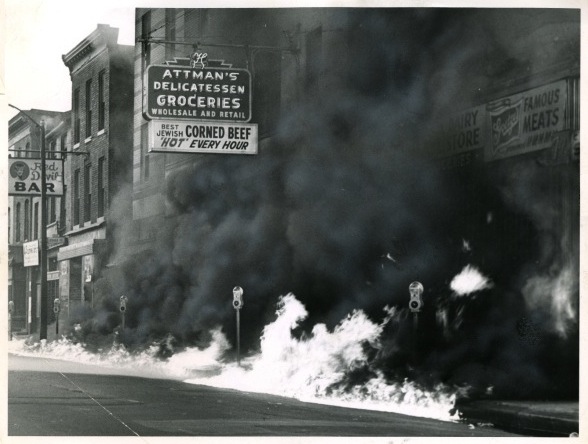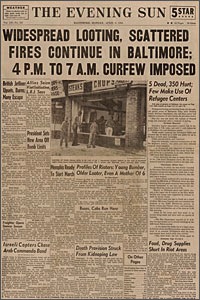
The 1968 Baltimore riots required a curfew to bring the city under control. Shown here — Attman’s Deli, on East Lombard Street not far from the Inner Harbor — is just one of many burning and loot- ing sites in the wake of Martin Luther King Jr.’s assassination. But is earlier curfew for teenagers & children really necessary in 2014?
HOME SUPERVISION NECESSARY
TO CORRECT TEEN PROBLEM;
LONG-RANGE SOLUTION NEEDED
But earlier curfew obscures issue
By David Maril
There’s no doubt that Baltimore’s new curfew law, requiring children and teens to be off the streets by 9 p.m., is well intentioned.
The law is expected to go into effect in a couple of months after the City Council passed it and Mayor Stephanie Rawlings-Blake signs it.
The curfew requires anyone under 14 to be indoors by 9 p.m., and teens 14-16 to be off the streets by 10 p.m. during the week and 11 p.m. on weekends.
Well-intended or not, doesn’t this legislation, among the toughest in the country, give Baltimore the feeling of being a police state? And isn’t this a rather simplistic way of addressing the complex issues of safety, crime and the overall welfare of the city’s youths?
Instituting a curfew is a pretty drastic measure that changes the whole mood and feeling of a city.
I remember, as a kid, the negative feeling when a curfew had to be instituted back in 1968 after the assassination of Dr. Martin Luther King and there were riots taking place in Baltimore. A curfew was certainly called for. It was a period of turmoil, anguish and severe uncertainty, and the murder of Sen. Robert F. Kennedy, who was seeking the Democratic nomination for president, would soon follow in Los Angeles.
Curfews are usually a last-ditch effort to maintain order and prevent mob violence, looting and chaos in the streets. To use them as part of finding a long-term solution to urban problems is questionable and you have to wonder if local government is overreaching.
Don’t get me wrong. Even though I don’t agree with the curfews, I hope they do work and prove to have a positive impact on safety and the quality of life.
However, I wonder about the following questions:

Baltimore Evening Sun reports local 4 p.m. to 7 a.m. curfew in April 1968 fol- lowing King’s assassination in Memphis.
STAFF AND MANPOWER TO ENFORCE LEGISLATION
Do city police and law enforcement people, already spread thin dealing with homicides, hard-core violence, and crime, have the staff and manpower to enforce this type of legislation against kids on the street?
Is this a good thing, from a long-term perspective, putting kids on the defensive, trying to stay out of sight of police at young ages if they are out on the streets beyond these curfews?
And do the legislators and the mayor who passed the curfew measures actually believe that just because unsupervised kids are out of sight they are staying out of trouble?
The issue isn’t just about being out on the streets. The problem is the fact, whether they are indoors or outside, they are not getting the supervision and responsible care needed.
Curfews won’t change this.
All of this reminds me of the clamor awhile back in different states around the country for a raising of driving ages.
A REGULAR LICENSE AFTER TURNING 16
It used to be you could get a regular license after turning 16. Now, states like Maryland have very comprehensive, and sensible, systems in place that include driver’s education programs and a provisional license period until the age of 18.
No system is foolproof and there still remain more careless, inexperienced teen drivers on the road, oblivious to the dangers of texting and talking on cellphones, than we all would like. We still hear and read about too many tragedies with young drivers, and their passengers, involved in fatal accidents related to excessive speed, and sometimes alcohol.
However, the problem continues to be effectively addressed through education programs. Attention is focused on making young drivers aware of the dangers and responsibilities they face when sitting behind the wheel.
And it’s good that these different education programs are effective. Getting a driver’s license can be an extremely positive milestone providing an important lesson for teens in learning about responsibility.
I remember what a big deal it is getting that first license, and if you are trained effectively by a good instructor and your parents have reinforced the importance of judgment and responsibility, it’s OK for teens to drive.
SHOULD NOT BE ALLOWED BEHIND THE WHEEL
Being an adult driver certainly doesn’t guarantee safety. We all know drivers with over 20 years of experience who are so aggressive, discourteous and dangerous they shouldn’t be allowed to sit behind the wheel.
But, getting back to teens, much depends on structure, leadership and supervision from the home.
A few years ago I saw something that still sticks in my mind.
I was filling up my car at a gas station and I heard the roar of an eight-cylinder Mustang pull up to a nearby pump. Even idling, the powerful motor was grumbling and rumbling at a menacing volume. Out of the car stepped a young-looking kid who was 16 or 17 but could have passed for anywhere from 13 to 15.
After putting a few gallons in the black sports car, he jumped back in and revved up the sharp-looking vehicle with the double exhaust pipes.
After a couple of roars, he accelerated out of the gas station lot, making a left turn, cutting off a car coming in the opposite direction.
The Mustang took off, hitting 60 in seconds. Long after it had disappeared from sight you could still hear the engine roaring.
THE DANGERS OF INTERFERING WITH TRAFFIC FLOW
All I could do was wonder whether this inexperienced driver had any clue as to how powerful the car he was driving was and if he had any concept of the dangers of interfering with traffic flow.
With the steering wheel in his hands, this sports car could be a deadly weapon. Did his parents, or guardians, have any idea how inappropriate it is for a novice driver to have this kind of powerful vehicle? How would they feel if he were in an accident caused by his reckless, high-speed driving?
Before the Mustang got out of my hearing range, I was hoping the sound of a police siren would surface, meaning the young “racer” was being stopped for speeding. I’d rather hear that than the noise of brakes screeching and a crash.
Hopefully for the kid’s sake, and the safety of the rest of us on the road, someone observed his foolhardy driving and delivered a strong warning.
It all makes you realize that even with strict regulations and mandatory education and training programs, a lot with teenagers still depends on sound judgment and supervision from home.
This is a complicated problem and there are no easy solutions that government, at the city, state or federal levels, can fix with a piece of legislation.
davidmaril@voiceofbaltimore.org
“Inside Pitch” is a weekly opinion column written for Voice of Baltimore by David Maril.
CHECK OUT LAST WEEK’S “INSIDE PITCH” COLUMN: click here
…and read archived Dave Maril columns by clicking here.






June 18th, 2014 - 9:28 AM
Baltimore is a deadly city. I favor the curfew; though have concerns regarding law-enforcement ability to carryout the Mayor’s agenda. Multiple gangs and young drug dealers have dominated the landscape of our city streets and wreaked havoc in recent years. If implementing a curfew reduces crime and young people being targeted, then Baltimore City will be a catalyst for other major metropolitan cities, and they will take notice, and so will we citizens of Charm City.